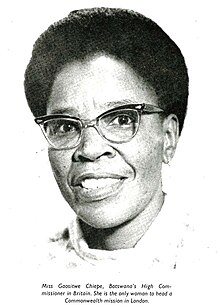Education
She attended primary school in Serowe and eventually went to Tiger Kloof Educational Institute,South Africa for secondary education,having received a scholarship as the best student in the country. [3] [8]
She then attended Fort Hare University,also in South Africa,where she received a Bachelor of Science as well as a postgraduate Diploma in education. [3] [7]
In 1958,she graduated from the University of Bristol in the UK with a master's degree. [4] Her thesis was entitled "An Investigation of the Problems of Popular Education in the Bechuanaland Protectorate in Light of a Comparative Study of Similar Problems in the Early Stages of English Education and in the Development of Education in Yugoslavia and Uganda. [2] [7]
She was awarded an honorary degree from Depaul University,United States. [3] Chiepe began her career in the Bechuanaland Protectorate Government in the Department of Education and was one of the first two Africans appointed to an administrative position (Education Officer) in the colonial government. [9] [10] Chiepe was the first woman education officer of Botswana. [3] [2]
Political career
Chiepe was the first female cabinet member in Botswana (1974) having become a Specially-Elected Member of Parliament. [6] [7] [11] [12] She was popularly elected to parliament from the Serowe South constituency in the Central District of Botswana in a by-election in 1977. [7] [11]
She was appointed to the post of high commissioner to United Kingdom and Nigeria and ambassador to West Germany,France,Denmark,Norway,Sweden and the European Economic Community from 1970 to 1974. [7] [12] [13] [14] During her time as High Commissioner in the UK,she chaired the fifth Caroline Haslett Memorial Lecture at the Royal Society of Arts. [7] Run by the Women's Engineering Society,Dr Letitia Obeng,then Director of Freshwater Research Institute of Aquatic Biology in Ghana spoke on 'Nation Building &the African Woman'. [15]
From 1974 to 1977,Chiepe was the Minister of Trade and Industry. From 1977 to 1984,she was the Minister of Mines &Natural Resources. [13] In 1982 Chiepe served as Honorary President of the Kalahari Conservation Society (KCS). [7]
In 1984,Chiepe became the Foreign Minister (Minister of External Affairs),in which position she remained until 1994. [2] [7] [10]
From 1994 to 1999,she was the Minister of Education. [13] Chiepe retired from government life in 1999 after nearly 30 years of high level positions. [13]
In 2013,she was the headline speaker at Botswana's International Day of Older Persons held in the Mokolodi Nature Reserve,saying ““We want to be ‘the aged in counsel and the young in action....Let us,as the elderly not be relegated to being dinosaurs but utilize our knowledge and hard earned wisdom to not only increase our relevance and longevity in society,but also increase the contact between generations,bridging the gap between young and old.” [2] [16]

Khama III, referred to by missionaries as Khama the Good also called Khama the Great, was the Kgosi of the Bangwato people.

Sir Seretse Goitsebeng Maphiri Khama, GCB, KBE was a Botswana politician who served as the first President of Botswana, a post he held from 1966 to his death in 1980.
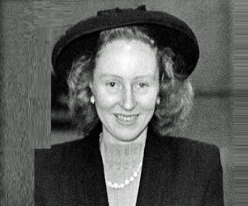
Ruth Williams Khama, Lady Khama was the wife of Botswana's first president Sir Seretse Khama, the Paramount Chief of its Bamangwato tribe. She served as the inaugural First Lady of Botswana from 1966 to 1980.
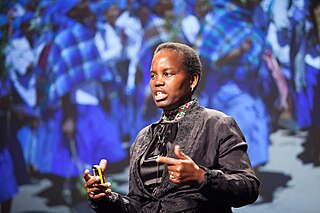
Unity Dow is a Motswana lawyer, author, human rights activist and Member of parliament for Kgatleng West since November 2024. She formerly served as a judge on the High Court of Botswana and in various Botswana government ministries. Born in Botswana to a seamstress and a farmer, who insisted on their children obtaining an education, Dow grew up in a traditional rural village before modernisation. She earned a law degree in 1983 from the University of Botswana and Swaziland, though her studies were completed in Swaziland and University of Edinburgh, Scotland, as Botswana had no law school at the time. After her graduation, Dow opened the first all-woman law firm in Botswana and in 1997 became the first woman to be appointed as a judge to the country's High Court.
Shoshong is a town in Botswana, formerly the chief settlement of the eastern Bamangwato.
Patrick van Rensburg was a South African-born anti-apartheid activist and educator. In the 1960s, he founded Swaneng Hill School in Serowe, Botswana, and the nationwide Brigades Movement in that country. In the 1980s, he founded the Mmegi national newspaper and the Foundation for Education with Production, which promoted his ideas in South Africa, Botswana, and Zimbabwe. In 1981, he was awarded the Right Livelihood Award "for developing replicable educational models for the third world majority".

Mompati Sebogodi Merafhe was a Botswana politician who was Vice-President of Botswana from 2008 to 2012. He was a retired Lieutenant-General and served as Minister of Foreign Affairs from 1994 to 2008.
Professor Sheila Dinotshe Tlou is a Botswana nurse, specialist in HIV/AIDS and women's health, and nursing educator. She was Minister of Health from 2004 to 2008. Professor Tlou is a distinguished advocate for human resources for health issues. She is a recognized visionary leader and champion.
Trade Unions in Botswana operate within a longstanding democratic system in which the government of Botswana has ratified the International Labour Organization's core conventions, including Conventions 87 and 98.
The Ba-ka-Nswazwi people are originally Bapedi of Mujaji. The Bapedi of Mujaji are Kalangas originally from Munomutapa and were ruled by Mugudo. They are found in Tutume, Nswazwi, Marapong, Masunga and Nkange in Botswana.
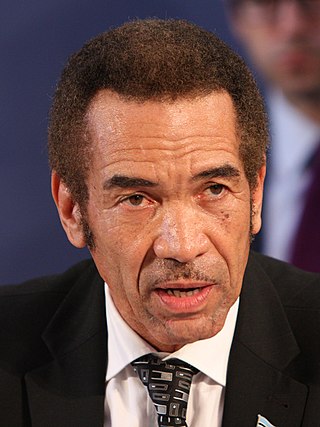
Seretse Khama Ian Khama is a Botswana politician and former military officer who was the fourth President of the Republic of Botswana from 1 April 2008 to 1 April 2018. After serving as Commander of the Botswana Defence Force, he entered politics and was Vice-President of Botswana from 1998 to 2008, then succeeded Festus Mogae as President on 1 April 2008. He won a full term in the 2009 election and was re-elected in October 2014.
Leetile Disang Raditladi (1910–1971) was a Motswana playwright and poet. He was born in Serowe and got his education in Tiger Kloof, Lovedale and Fort Hare University. A prolific author, he had his first book, a biography of Khama III, accepted for publication while still in high school at Lovedale. This book was later quashed by the Bechuanaland Protectorate authorities and was not published.
Margaret Nnananyana Nasha is a Botswana politician who served as the Speaker of the National Assembly from 2009 to 2014. She was the first woman to hold the position.

The Three Dikgosi Monument is a bronze sculpture located in the Central Business District of Gaborone, Botswana. The statues depict three dikgosi, or tribal chiefs: Khama III, Sebele I, and Bathoen I. The three dikgosi played important roles in Botswana's independence. In 1895, the three men traveled to Great Britain to ask Joseph Chamberlain, Secretary of State for the Colonies, and Queen Victoria to separate the Bechuanaland Protectorate from Cecil Rhodes's British South Africa Company and Southern Rhodesia. Permission was then granted which made Botswana under direct British rule until its independence. There are six plinths giving information about Botswana's independence and struggles. A large coat of arms is featured in front of the three statues. A contract was given to North Korean company Mansudae Overseas Projects to build the monument, which resulted in disappointment from local sculptors. Some minority ethnic groups in Botswana see it as a decree of Tswana dominance.
Gaolese Kent Koma was a Botswana politician and businessman. He served in the National Assembly as Member of Parliament for Mahalapye village from 1965 to 1994.
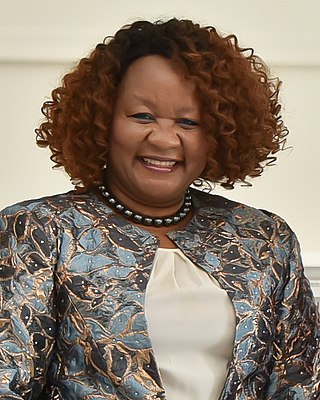
Dorcas Makgato is Botswanan businesswoman. She was born in Serowe, Botswana and grew up in the capital city Gaborone. She served as a Minister in the Cabinet of Botswana. She was also one of the young hopefuls that marked the 10th anniversary of Botswana's independence with a march past for the first President in 1976. From 2019 she has been serving as Botswana's ambassador to Australia.Makgetho Malesu completed her tenure as Botswana's High Commissioner to Australia in 2023 and served in this diplomatic role for four years before returning to Botswana.
Elizabeth Pulane Moremi (1912–1994) was regent and mohumagadi (queen) of baTawana from 1946 to 1964 while her son, Letsholathêbê II a Morêmi, was too young to rule. She married Moremi III, the ruler of baTawana, in 1937. When he was killed in a 1946 car crash, she was made regent. In this role, Moremi attempted to make several progressive reforms but was hindered by conservative opposition. She stepped down in 1964 and worked at a school until her death, thirty years later.
Batswana nationality law is regulated by the 1966 Constitution of Botswana, as amended; the Citizenship Act 1998, and its revisions; and international agreements entered into by the government of Botswana. These laws determine who is, or is eligible to be, a national of Botswana. The legal means to acquire nationality, formal legal membership in a nation, differ from the domestic relationship of rights and obligations between a national and the nation, known as citizenship. The Botswana nationality is typically obtained on the principle of jus sanguinis, i.e. by birth to parents with Botswana nationality. It can be granted to persons who have lived in the country for a specific period of time, who have performed distinguished service to the nation or who have an affiliation to the country through naturalisation.
The Khama III Memorial Museum is a museum located in Serowe, Botswana. The museum is dedicated to the history of the Khama family and Serowe.

Philip Parcel Goanwe Matante was a Motswana nationalist and founder of the Botswana People's Party. He was the opposition leader in the National Assembly of Botswana from its establishment in 1965 until his death in 1979.
